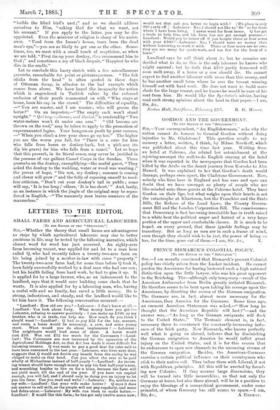LETTERS TO THE EDITOR.
SMALL FARMS AND AGRICULTURAL LABOURERS. [To THE EDITOR OF THE " SPECTATOR.".]
Sin, Whether the theory that small farms are advantageous as steps by which agricultural labourers may rise to better positions in life, may be tested by the following narrative, which almost word for word has just occurred. An eighty-acre farm becoming vacant, was applied for and let to a man here called Q, who had recently taken a twenty-two-acre farm on his being joined by a mother•in-law with some " property:' The twenty-two-acre farm had, for some time before Q took it, been fairly successfully worked by a deaf man who had one son ; but his health failing from hard work, he bad to give it up. It is applied for by a large farmer, who, as an inducement to the landlord, says that it would save building some sheds that he wants. It is also applied for by a labouring man, who, having a useful wife and no family, has saved a little money. He is strong, industrious, and steady, and the landlord would like to let him have it. The following conversation occurred :—
" Landlord : How old are you ?—Labourer : I don't know at all.— Landlord : You look about forty. What money have you got ?Labourer, refusing to answer positively : I can make up £100, as my brother, who is in trade, can help me. How much do you think I should want ?—Landlord : Q had to pay £52 for the hay, manure, and roots, a horse would be necessary, a cow, and some young stock. What would you do about implements ? — Labourer : The neighbours would lend some of them. A horse would coat £10. Was not £52 too much for the Covenants PT—Landlord The Covenants are now increased by the operation of the Agricultural Holdings Act, so that Act has made it more difficult for incoming tenants. Q was made to pay a good deal for cake said to have been consumed in the last year.--Labourer, who lives next door, suggests that Q would not derive any benefit from the outlay he was obliged to make on that head. Can you allow the rent to be paid wholly at Michaelmas instead of half-yearly ?—Landlord : An incoming tenant should have enough money to pay his first half-year's rent, and something besides to live on for a time, because the farm will not yield much till the end of the year. If you have not capital enough, you will fail, and I should only be doing you an injury to let you the farm. Can you read and write ? —Labourer : No, neither can my wife.—Landlord : Can your wife make butter ? Q says it does not answer to sell milk, as the people will not pay regularly, and some bad debts ocean—Labourer; My wife can learn to make butter.— Landlord : B would like this farm ; he has got only twelve acres now;
would not that suit you better to begin with ? [B's place is only 300 yards off.] —Labourer : No ; 1 should not like to flit' so fur from where I have been living. I never went far from home. Q has got a trade to help him, and his farm has not got enough pasture.— Landlord : Would you be better off if you bought three or four acres with your 2100 ?—Labourer : No; I should have no money then without borrowing to work it with. Three or four acres are no use; they are too many for spade-work, and too few for the keep of a horse."
Landlord says he will think about it; but he remains undecided what to do, as this is the only labourer he knows who might succeed ; but he feels that £100 partly borrowed will soon melt away, if a horse or a cow should die. He cannot expect to find another labourer with more than this money, and ho has another small farm where he sees the tenant wearing himself out with hard work. He does not want to build more sheds for the large tenant, and he knows he would be sure of his rent from him. He would like the Spectator's advice, having read such strong opinions about the land in that paper.-1 am, Sir, &c., Keeton Hall, Sicatllaw, February 271h. R. II. lifssox.














































 Previous page
Previous page